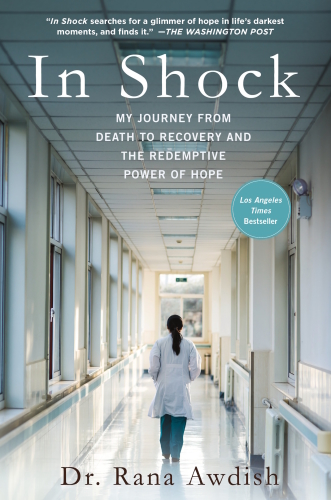
In Shock
My Journey from Death to Recovery and the Redemptive Power of Hope
سفر من از مرگ به بهبودی و نیروی رهاییبخش امید
کتاب های مرتبط
- اطلاعات
- نقد و بررسی
- دیدگاه کاربران
نقد و بررسی

August 14, 2017
Awdish’s debut memoir is a compassionate and critical look at medicine and illness from both a doctor’s and a patient’s perspective. Awdish, the director of the pulmonary-hypertension program at Henry Ford Hospital in Detroit, suddenly saw things from the other side of the table when, late into her pregnancy, she arrived at the hospital where she worked with internal bleeding and a near-fatal preeclampsia condition, called HELLP syndrome. She describes the hospital as “an inner-city hospital with advanced subspecialty services that took care of the sickest of the sick” and recounts that as a patient there, she relearned how to approach patients. The baby died in utero, and for the several years she cycled in and out of the hospital fighting to stay alive with various organ failures that resulted from the condition. Her book is an intimate account of her recovery with the help of her doctors. Over the course of her journey, she comes to understand how doctors fail to fully humanize their patients, arguing that they become more concerned with patients’ symptoms and
a diagnosis than with the actual patients themselves. She also provides a self-reflective account of suffering from a chronic illness with the desire to be heard as a patient. She writes of her professional life: “It’s a very different course than the one I set out on all those years ago when I believed healing to be clean, academic and straightforward. It’s far more humble, honest, and informed by an ocean’s weight of suffering.” Awdish has written a unique and insightful memoir. Jacqueline Murphy, Inkwell Management.

August 15, 2017
A physician learns firsthand about the adverse aspects of the patient experience through her own catastrophic illness.Detroit-based critical care physician Awdish began experiencing waves of abdominal pain and nausea while seven months pregnant with her first child and checked in at her workplace emergency department. Even before she was diagnosed and treated, she personally acknowledged the detachment patients often experience between themselves and the medical professionals charged with their clinical care, something she categorizes as an "unsettling, largely unspoken reality" in contemporary medicine. While she blames the conventional methodology of physician training, with its unwavering focus on disease diagnosis and distance to avoid burnout, she also recognizes that, as a doctor, she was in need of compassionate care training in order to connect with patients on more levels than directly pathological. "Despite completing my training," she writes, "despite being surrounded by every form and severity of disease, I had yet to learn what it meant to be sick." This, and further episodes of enlightenment, underpins the book's core foundation. Awdish's initially unknown malady eventually ballooned into an affliction of nightmarish proportions. Miraculously delivered from her deathbed, she survived internal bleeding, a stroke, liver tumors, and a heartbreaking miscarriage. Awdish also had to suffer the callous missteps and insensitive presuppositions made by hospital staff. Punctuated by descriptions of harrowing moments like waking up while on a mechanical respirator or developing hernias after surgeons applied quick stitches meant for an irremediable patient, the utter senselessness of illness reverberates throughout this carefully written chronicle of suffering and recovery. As the author returned to her livelihood as a humbled physician and grateful mother, she fully embodied and shared the knowledge that there could indeed be "reciprocity in empathy" in medicine. A sobering, well-rendered reality check on the desperate need for advanced training on compassion-centric modes of patient care.
COPYRIGHT(2017) Kirkus Reviews, ALL RIGHTS RESERVED.

Starred review from October 1, 2017
In a gut-wrenching memoir approaching Job-level suffering, Awdish recounts her ordeal as a doctor-turned-patient and the many changes in her perspective and practice of medicine. During her seventh month of pregnancy, the 33-year-old Awdish goes into shock due to profuse internal bleeding. She is near death and has an out-of-body experience. She undergoes emergency surgery, is placed on a ventilator, and suffers a stroke. Her baby girl dies. Awdish's condition is misdiagnosed as HELLP syndrome, a rare combination of liver failure and bleeding during pregnancy. But it is actually the result of benign liver tumors (hepatic adenomas) that are prone to rupture and massive bleeding. Half her liver is surgically removed. She astonishingly returns to work at her demanding, high-pressure job and later gives birth to a son. Awdish's emotional tenor is electric (and understandable): angry, anxious, self-pitying, vulnerable, even terrified. But she's also heroic, smart, and determined. She ponders notions of risk, failure, remorse, and empathy in the medical profession. She wonders who or what should ultimately get the credit for her miraculous survival, the medical treatment and surgical skills of her physicians, fate, luck, or God? One thing is certain: Hope is not just hype. It's a real force and very potent.(Reprinted with permission of Booklist, copyright 2017, American Library Association.)

























دیدگاه کاربران